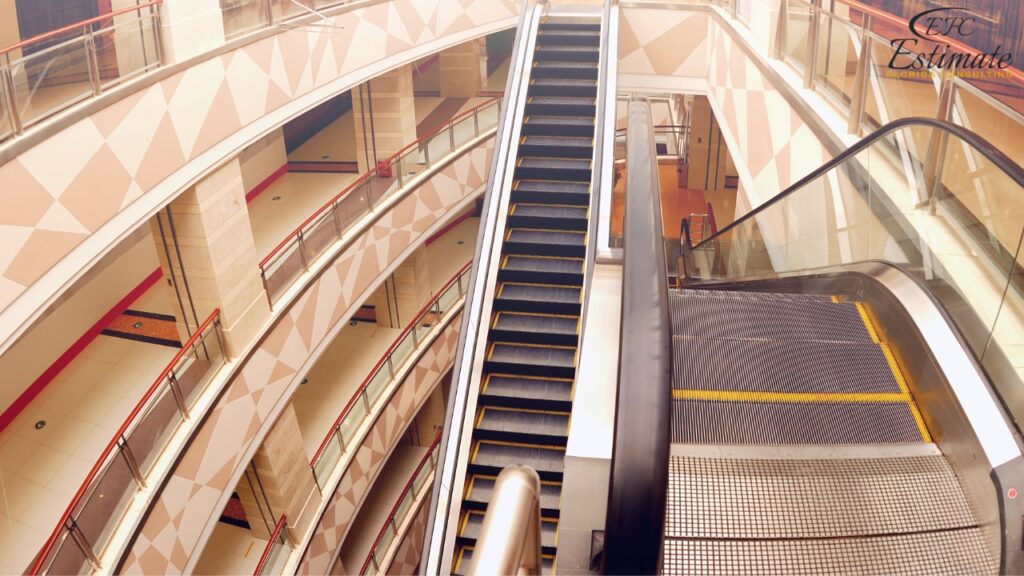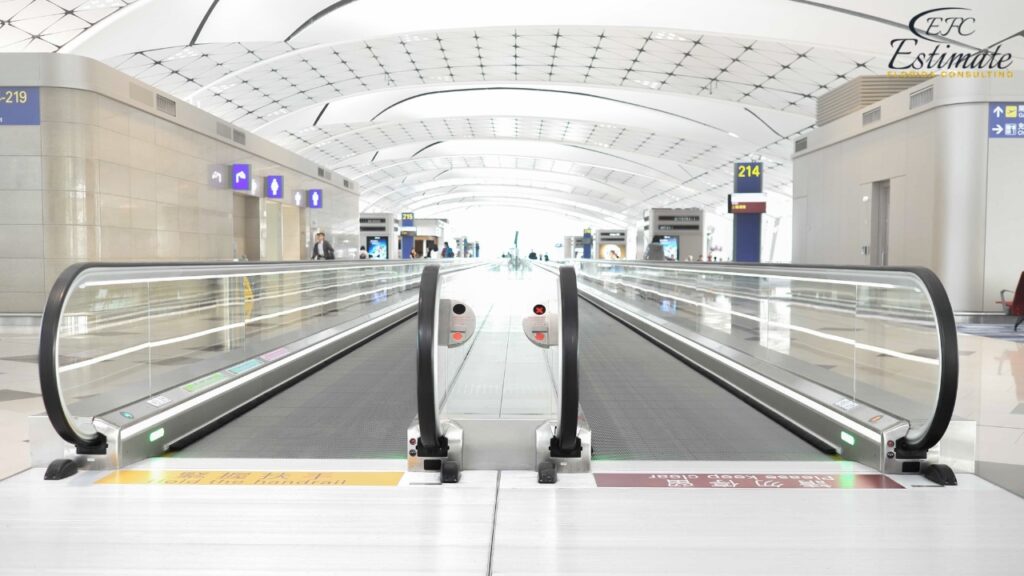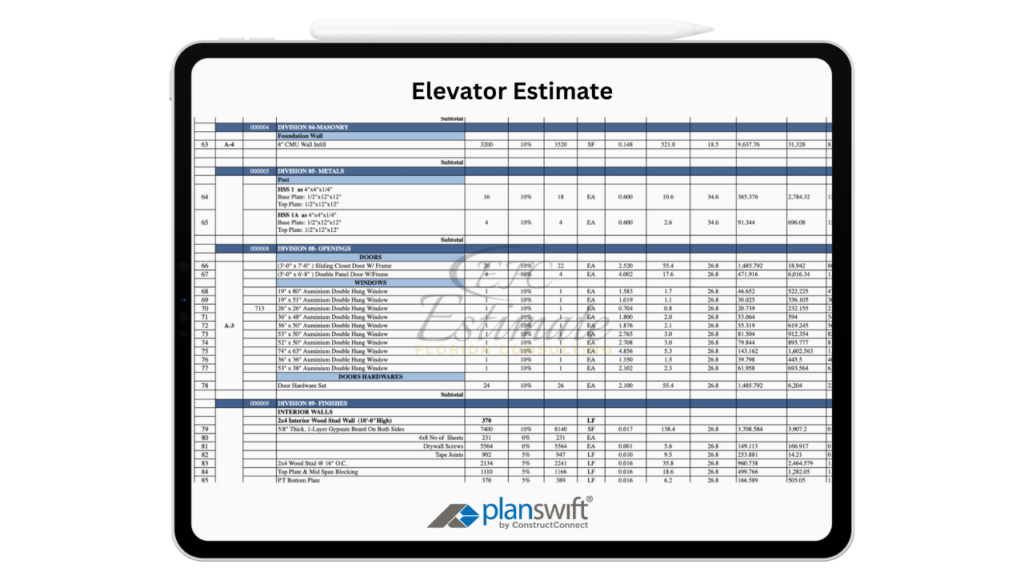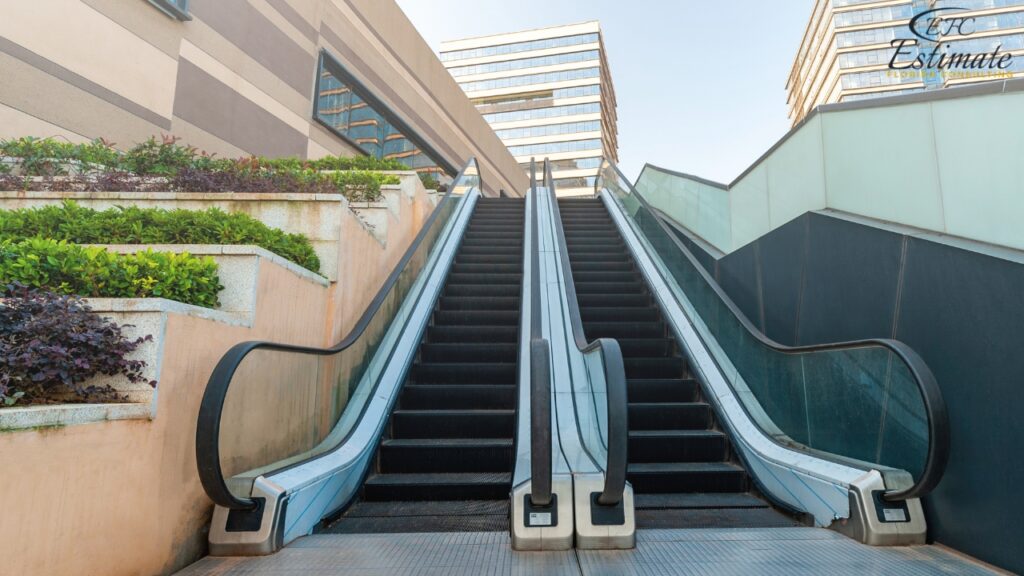How Much Does a Commercial Elevator Cost?
The average cost of a commercial elevator now ranges from $32,500 to $130,000 or more, depending on various factors such as size, type, and installation complexity. On a per-floor basis, the cost typically ranges from $19,500 to $32,500. These figures can shift based on the specific requirements of the building, including its height, the materials used in construction, and the intended usage of the elevator. It’s essential to factor in both the purchase price and the installation costs when budgeting for a commercial elevator project, as these expenses can vary significantly based on the specific requirements of the building.

Thus, a comprehensive understanding of the costs involved is crucial for making the right choices and ensuring a successful installation.
Elevator Type | Cost Range | Additional Notes |
Hydraulic Elevators | $32,500 – $65,000 | Common for low-rise buildings (up to 5 stories) |
Traction Elevators | $65,000 – $130,000 | Suitable for mid-rise buildings (5 to 20 stories) |
Machine Room-less Elevators | $65,000 – $130,000 | Space-saving design, ideal for various applications |
Dumbwaiters | $26,000 – $39,000 | Small elevators for transporting goods only |
Factors Influencing Commercial Elevator Costs
Several factors can influence the overall cost of a commercial elevator installation. Understanding these factors can help stakeholders plan their budgets more effectively and ensure they choose the right elevator for their specific needs.
Type of Elevator
The type of elevator significantly impacts the cost. Hydraulic elevators are generally less expensive and are commonly used in low-rise buildings. They utilize a hydraulic piston to lift the elevator car, making them efficient for shorter distances but less suitable for taller structures. Traction elevators, on the other hand, are more suitable for mid-rise and high-rise buildings and tend to be more expensive due to their complexity and higher capacity. These elevators use a system of pulleys and cables, allowing for smoother rides over greater distances. Machine room-less elevators, which do not require a separate machine room, can save valuable building space but may have higher installation costs due to the advanced technology involved. Additionally, dumbwaiters, designed for transporting goods rather than passengers, are a more affordable option for certain applications, but they come with their own set of installation considerations.
Number of Floors and Travel Distance
The number of floors the elevator needs to service and the overall travel distance will directly affect the installation cost. Elevators designed for taller buildings require more complex systems and materials, resulting in higher expenses. Additionally, the installation process may become more intricate and time-consuming, leading to increased labor costs. More floors and longer travel distances typically mean higher costs due to the need for additional components such as cables, pulleys, and safety systems. It’s essential for property owners to assess their specific needs accurately, as this will not only influence the cost but also the operational efficiency of the elevator over its lifetime.
Floors Served | Estimated Cost Range |
2 Floors | $32,500 – $45,500 |
5 Floors | $45,500 – $84,500 |
10 Floors | $84,500 – $130,000 |
15+ Floors | $130,000+ |
Customization and Features
Custom features, such as advanced control systems, energy-efficient designs, or specialized cab interiors, can also increase the cost of a commercial elevator. Elevators equipped with modern technology, such as smart controls and energy-saving options, may have higher initial costs but can lead to long-term savings on energy bills and maintenance. Customization can enhance the aesthetics and functionality of the elevator, making it more suitable for the building’s specific requirements and branding. However, it’s essential to balance the desire for features with the available budget, as additional customization can significantly impact the overall cost.

Custom features can include LED lighting, custom wall finishes, and unique control panel designs, which can improve user experience and contribute to the overall value of the building.
Installation Costs
Installation costs for commercial elevators can vary depending on the complexity of the project and local labor rates. On average, installation can account for 30% to 50% of the total cost, which emphasizes the importance of selecting a qualified contractor. It is essential to work with experienced contractors who understand local codes and regulations to ensure a safe and compliant installation. Proper installation is crucial for the elevator’s functionality and safety, so investing in skilled labor is essential. Factors such as site accessibility, building codes, and structural considerations can also affect the complexity and cost of the installation process.
Installation Type | Cost Range | Notes |
Basic Installation | $9,750 – $19,500 | Standard installations without customization |
Complex Installation | $19,500 – $39,000 | Projects with customization and additional features |
90% More Chances to Win Projects With Our Estimate!
- Multi-Family Building
- Hotel Building
- Hospital Building
- Warehouse Building
- School & University Building
- High-Rise Building
- Shopping Complex
- Data Center Building

Maintenance and Operating Costs
In addition to the initial purchase and installation costs, ongoing maintenance and operating expenses should be factored into the overall budget. Commercial elevators typically require regular inspections and maintenance to ensure safety and compliance with building codes. Maintenance costs can range from $1,300 to $3,250 annually, depending on the elevator type and usage. Proper maintenance is crucial for extending the lifespan of the elevator and minimizing unexpected repair costs. Regular servicing can include lubrication, inspections of safety mechanisms, and replacement of worn components, ensuring that the elevator remains in optimal working condition throughout its lifespan.
Maintenance Cost | Estimated Annual Cost |
Routine Inspections | $650 – $1,300 |
Repairs and Emergency Services | $650 – $1,950 |
Building Codes and Compliance Costs
When installing a commercial elevator, it’s essential to consider local building codes and regulations. Compliance with these codes can sometimes incur additional costs, such as installing safety features or making structural adjustments to accommodate the elevator. These requirements ensure the safety of elevator passengers and are vital for obtaining necessary permits. Understanding local codes upfront can help avoid unexpected costs during installation, as failure to comply can lead to fines or costly modifications down the line. It is advisable to consult with professionals who have experience navigating these regulations to ensure a smooth installation process.
Financing Options for Commercial Elevators
Many businesses may consider financing options when investing in a commercial elevator. Various financing solutions are available, including loans, leasing, and grants, depending on the type of business and its financial situation. Researching available financing options can provide flexibility and ease the financial burden of purchasing and installing a commercial elevator. Additionally, some manufacturers offer financing plans that may include promotional interest rates or extended payment terms, making it easier for businesses to manage their budgets while investing in essential infrastructure.

Elevator Technology Advancements
In recent years, advancements in elevator technology have led to more efficient and reliable systems. Modern elevators often incorporate energy-efficient motors, smart controls, and advanced safety features, resulting in lower operating costs and improved user experiences. These advancements not only enhance the functionality of elevators but can also contribute to the overall sustainability of the building. Innovative technologies, such as destination dispatch systems, optimize elevator usage by grouping passengers going to the same floor, reducing wait times and energy consumption.
Impact on Property Value
Investing in a commercial elevator can significantly impact the property’s value. Properties with elevators are often more appealing to tenants and buyers, especially in urban areas where accessibility is a key concern. A well-maintained elevator can enhance the overall aesthetics and functionality of the building, making it a worthwhile investment for property owners. Moreover, the presence of an elevator can justify higher rental rates and attract a wider range of tenants, ultimately contributing to increased revenue streams and higher property appreciation.
Download Template For Elevator Project Breakdown
- Materials list updated to the zip code
- Fast delivery
- Data base of general contractors and sub-contractors
- Local estimators

Conclusion
The cost of installing a commercial elevator can vary widely based on factors such as type, number of floors, customization, installation complexity, and ongoing maintenance. Understanding these costs is essential for making informed decisions and effectively budgeting for a commercial elevator project. By working with reputable contractors and considering long-term maintenance expenses, property owners can ensure that their investment in a commercial elevator provides both safety and accessibility for building occupants. Properly installed and maintained elevators enhance the overall value of the property and improve the experience for tenants and visitors alike, making them a smart and strategic investment for the future.
FAQs
The average cost of installing a commercial elevator ranges from $32,500 to $130,000 or more. This wide range reflects variations based on elevator type, building height, and installation complexity. On a per-floor basis, costs typically range from $19,500 to $32,500. It is important to consider both the purchase price and installation costs when budgeting for a commercial elevator project.
Here are common types of commercial elevators and their estimated costs:
- Hydraulic Elevators: $32,500 – $65,000. These are commonly used in low-rise buildings (up to 5 stories) and use a hydraulic piston for lifting.
- Traction Elevators: $65,000 – $130,000. Suitable for mid-rise buildings (5 to 20 stories), these elevators use pulleys and cables for a smoother ride over greater distances.
- Machine Room-less Elevators: $65,000 – $130,000. These elevators save space by eliminating the need for a separate machine room and are ideal for various applications.
- Dumbwaiters: $26,000 – $39,000. Designed for transporting goods rather than passengers, dumbwaiters are a more affordable option for certain uses.
Several factors affect the cost of a commercial elevator, including:
- Type of Elevator: Hydraulic elevators are generally less expensive, while traction and machine room-less elevators are more costly due to their complexity and technology.
- Number of Floors and Travel Distance: More floors and longer travel distances increase costs due to the need for additional components and more complex installation.
- Customization and Features: Custom features like advanced controls, energy-efficient designs, and specialized cab interiors can add to the cost.
- 2 Floors: $32,500 – $45,500
- 5 Floors: $45,500 – $84,500
- 10 Floors: $84,500 – $130,000
- 15+ Floors: $130,000+
Installation costs can vary significantly:
- Basic Installation: $9,750 – $19,500. Includes standard installations without customization.
- Complex Installation: $19,500 – $39,000. Includes projects with customization and additional features.
Maintenance costs typically range from $1,300 to $3,250 annually. This includes:
- Routine Inspections: $650 – $1,300
- Repairs and Emergency Services: $650 – $1,950
Compliance with local building codes can incur additional costs, such as installing safety features or making structural adjustments. These requirements are essential for ensuring safety and obtaining necessary permits. Consulting with professionals familiar with local codes can help avoid unexpected costs.
Financing options include loans, leasing, and grants. Some manufacturers also offer financing plans with promotional interest rates or extended payment terms. Researching financing options can ease the financial burden and provide flexibility.
Modern elevators incorporate energy-efficient motors, smart controls, and advanced safety features, which can lead to higher initial costs but lower operating expenses. Technologies like destination dispatch systems improve efficiency and reduce energy consumption.
A commercial elevator can significantly enhance a property’s value by increasing its appeal to tenants and buyers. It can also justify higher rental rates and contribute to greater property appreciation, making it a valuable investment.
Google Reviews



Process To Get Commercial Elevator Cost Estimate Report
Here I am going to share some steps to get commercial elevator cost estimate report.
-
You need to send your plan to us.
You can send us your plan on info@estimatorflorida.com
-
You receive a quote for your project.
Before starting your project, we send you a quote for your service. That quote will have detailed information about your project. Here you will get information about the size, difficulty, complexity and bid date when determining pricing.
-
Get Estimate Report
Our team will takeoff and estimate your project. When we deliver you’ll receive a PDF and an Excel file of your estimate. We can also offer construction lead generation services for the jobs you’d like to pursue further.

